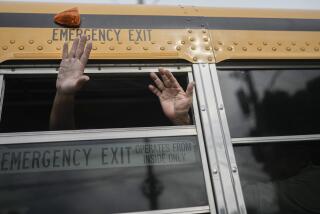Hostage-Takers Seize Journalists in Managua
MANAGUA, Nicaragua — Efforts to resolve Nicaragua’s double hostage crisis were complicated Sunday when gunmen already holding Nicaragua’s vice president and 19 other prisoners in Managua seized nine Nicaraguan journalists and refused to negotiate.
But another group holding hostages in the northern mountains reportedly promised to free some of their captives.
The hostage crisis has deepened the abyss in which the government of President Violeta Barrios de Chamorro finds itself. Paralyzed by political bickering and the lingering hatreds of more than a decade of war and insurrection, the government and the nation seem mired in chaos.
“The country cannot take it anymore,” La Prensa, the newspaper owned by Chamorro’s family, said in a front-page editorial. “Kidnaping spawns kidnaping, one crime provokes another crime. . . . The saying that violence spawns violence has been proven once again, at the same time that Nicaragua is entering the most acute phase of its political crisis.”
Pro-Sandinista gunmen in Managua who had released 14 of their 34 prisoners late Saturday turned the tables Sunday by capturing nine Nicaraguan journalists covering the story.
Their other hostages, including Vice President Virgilio Godoy, were moved to rooms without electricity or water inside the headquarters of the conservative National Opposition Union, or UNO, which the gunmen first stormed Friday night.
“The picnic is over,” said the lead hostage-taker, identified in press reports as Donald Mendoza, a former major in the Sandinista People’s Army. “We are hardening our position.”
He later announced that two government-appointed negotiating teams had failed in their mission to defuse the crisis and were “disqualified” as far as the hostage-takers were concerned.
Apparently fearing a police attack, the gunmen opened fire Sunday afternoon, sending reporters and police scurrying. Presidential spokesman Danilo Lacayo had been trying to hold an impromptu news conference a short distance from the UNO headquarters when gunfire rang out, forcing him to duck and dive for cover.
Clearly becoming nervous and agitated, the gunmen also forced their captives, including former National Assembly President Alfredo Cesar and other conservative legislators, to stand in front of the building’s windows in their underwear and stocking feet.
Earlier, a dispirited Godoy--who himself broke with Chamorro and is one of her most outspoken critics--seemed to be losing hope in the government’s ability to handle the crisis. “The press, the police, the public and the government will all grow bored with this,” Godoy said, “and we’ll spend the rest of our days here.”
Meanwhile, rearmed former Contra rebels in the northern hills who Thursday had seized a 41-member delegation of legislators and others carrying an offer of amnesty reportedly agreed Sunday to release 20 of their hostages, wire services reported.
The pro-Sandinista Channel Four said the former Contras would release the remaining captives later but did not say when. Earlier, the Contras had rejected mediation efforts, saying that they would negotiate only with Cardinal Miguel Obando y Bravo, the government’s Radio Nicaragua had reported.
The earlier reports, from the remote northern town of Quilali, where the rearmed Contras are based, said the band of hostage-takers had refused to meet with the government delegation.
Obando y Bravo, who frequently has mediated this nation’s seemingly endless crises, was maintaining a low profile.
The United States spent millions of dollars through the 1980s to finance the Contra rebels’ fight against the leftist Sandinista government. The bitter Cold War struggle claimed an estimated 30,000 Nicaraguan lives.
With the upset victory of Chamorro and her conservative political coalition over former Sandinista President Daniel Ortega in 1990 elections, the war ended and hopes for reconciliation began.
But the continued influence of the Sandinista Front in the government--Sandinistas remain in control of the army and police--angered conservatives and drove Chamorro’s allies to abandon her. Isolated and weakened, the Chamorro government has suffered blow after blow.
Most recently, the U.S. Senate voted to suspend $98 million in aid after the explosion of a secret arms dump belonging to Salvadoran guerrillas raised questions about the Sandinistas’ ties with international terrorists--and Chamorro’s ability to control the Sandinistas.
“War, anarchy and blood are at the doorstep of our house,” a pro-leftist group of religious workers said Sunday in a statement. “Even the politicians who have been fanning the flames may now be panicked because after throwing gasoline on the fire, the fire caught them.”
More to Read
Sign up for Essential California
The most important California stories and recommendations in your inbox every morning.
You may occasionally receive promotional content from the Los Angeles Times.











